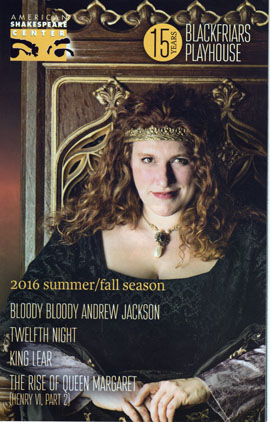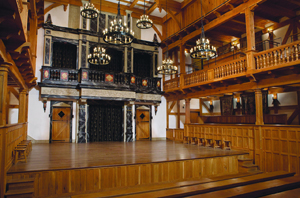 “When the heck else will we ever get to see this?” With every seasonal email from the American Shakespeare Center, I ask myself this question—and then I gladly make the three-hour trek to Staunton, Virginia, to see a play I’ll never see on any other stage, let alone in a faithful reconstruction of the Blackfriars, Shakespeare’s indoor theater. This time, the play was Henry VI, Part 2, not juilenned in the interest of run time or mashed up with other plays in the trilogy but staged in its entirety as part of a three-year “War of the Roses” event—and marketed, cheekily, as “The Rise of Queen Margaret.”
“When the heck else will we ever get to see this?” With every seasonal email from the American Shakespeare Center, I ask myself this question—and then I gladly make the three-hour trek to Staunton, Virginia, to see a play I’ll never see on any other stage, let alone in a faithful reconstruction of the Blackfriars, Shakespeare’s indoor theater. This time, the play was Henry VI, Part 2, not juilenned in the interest of run time or mashed up with other plays in the trilogy but staged in its entirety as part of a three-year “War of the Roses” event—and marketed, cheekily, as “The Rise of Queen Margaret.”
Henry VI, Part 2 isn’t subtle or artfully written, but the Blackfriars players make it fun just to see the damned thing at all. In the current production, which runs through November, Chris Johnston nails his role as Henry, a pious doofus who’s out of his depth. Allison Glenzer (who was haunting as the Jailer’s Daughter in The Two Noble Kinsmen in 2013) gives the cheating, scheming Queen Margaret unexpected heart and soul; no one laughs as she cradles the severed head of her lover. Rene Thornton, Jr., does double duty as both a hounded, frazzled Gloucester and, late in the play, the future Richard III, gleefully wielding a spiked and shielded crutch. ASC newcomer Jessika Williams is subtle and poignant as Gloucester’s wife, Eleanor, whose tenderly depicted marriage falls apart when political winds blow ill. The preposterously versatile John Harrell (who cracked me up in Ben Jonson’s Epicene in 2014) makes a good Duke of York, ambitious and haughty, and earns a blast of applause after a genealogical discourse that’s as effortless as it is endless. And then David Anthony Lewis comes roaring in, as if flung from a Viking mosh pit full of cocaine, to brutalize England as the willfully ignorant rebel Jack Cade.
Those were my favorites, but the truth is, everyone at the Blackfriars is good—because who signs on to play multiple roles in four or five plays per season, four seasons a year, for years at a time, unless they love the theater more than they love sleep, leisure, or life itself? The actors also introduce each performance, sell raffle tickets, play songs at intermission, and handle the on-stage concessions. Their bios in the playbill all include a line like “more than 123 roles in 99 productions”—a staggering claim when few of them seem older than 40. I can’t imagine that there are more dedicated stage actors anywhere in North America; maybe that’s how they always make American-accented English sound like Shakespeare’s natural voice.

I’ve seen plenty of Shakespeare productions by other, bigger companies, and they’re too often beguiled by novelty: Measure for Measure presented as a nude Weimar cabaret, Two Gentlemen of Verona as special-effects-laden grunge-melodrama with U2-themed karaoke, a drag-queen Taming of the Shrew strained beyond its limits with 18 pop songs by Duncan Sheik. I wince to remember a lifeless All’s Well That Ends Well that ended with the grinning cast, clad in World War I costumes, breaking into a frantic, almost apologetic riverdance.
The folks in Staunton do none of that. They study the play, learn their lines, and then come out on a bare but beautiful stage to interpret their characters almost entirely through voice, motion, and costuming, tight formal constraints that make every performance immediate and real. Despite the breezy atmosphere—including pre-show pop concerts and improvised interactions with audience members, who themselves may be drinking beer or scarfing down gummi bears—their work feels, in its fashion, more respectful of its source material than productions by larger companies. The Blackfriars actors let you see a play for what it is; they make you all the more aware of how other companies can smother a play under sets, lighting, and boffo art direction in the name of “deconstructing,” “reimagining,” or “reinterpreting” it.
The Blackfriars Playhouse celebrates its 15th birthday this month. I can’t imagine a better place to keep filling in the massive gaps in my knowledge of English theater and be entertained with every nutty visit. These folks turn even weak plays into crowd pleasers—and really, who else is going to stage Fletcher and Massinger’s ridiculous 1622 Tempest-inspired, horny-Amazon comedy The Sea Voyage? Where else will you see Beaumont and Fletcher’s naughty-bits stab-fest The Maid’s Tragedy? Happy birthday and congratulations, Blackfriars; I hope this post finds you a few new fans. To swipe the final triumphant line of the play I saw last night: “And more such days as these to us befall!”

The traveling company came by this year, so we didn’t get the theater, but otherwise, so wonderful.
The pre- and inter-act songs are hilarious. Almost every choice was appropriate to the play – “Anarchy in the UK” and a Mountain Goats song about the founding of Rome before “Julius Caesar,” for example. I was amazed by how many instruments each actor played.
LikeLike
Thanks for stopping by, Tom! Yeah, it’s funny: there’s an outward irreverence about the ASC that belies how seriously they take their craft and how committed they are to doing something that’s intellectually and culturally ambitious.
I first saw them back when they were known as Shenandoah Shakespeare Express. They did Beaumont’s “Knight of the Burning Pestle” at the Folger in D.C.; I had never seen an audience have so much fun.
LikeLike
I go through Staunton a few times each year. I’ll have to plot some attendance, clearly!
“Beguiled by novelty”: we sometimes see that locally at the Glimmerglass Opera….
LikeLike